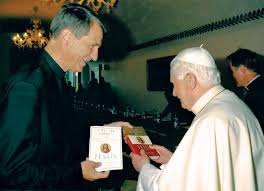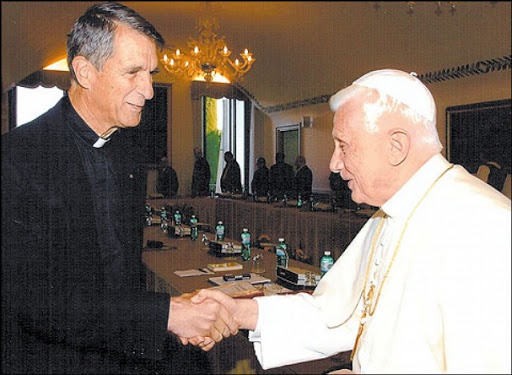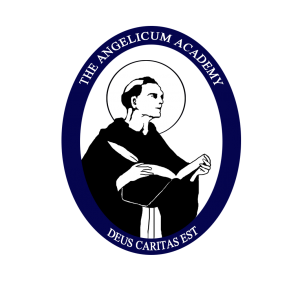Theology Online with Fr. Joseph Fessio, S.J., Th.D.
 Fr. Joseph Fessio, Founder of Ignatius Press – Publisher of the Holy Father’s two JESUS OF NAZARETH books, will be offering online theology courses with lectures on each book chapter, study questions, and video clips with the answer to each of the study questions, and exams.
Fr. Joseph Fessio, Founder of Ignatius Press – Publisher of the Holy Father’s two JESUS OF NAZARETH books, will be offering online theology courses with lectures on each book chapter, study questions, and video clips with the answer to each of the study questions, and exams.
Each of the four Theology Online courses by Fr. Joseph Fessio is a ‘stand-alone’ course, which means the four courses may be taken in any order. Each course has been recommended for three college credits by the American Council on Education. However, because some are more difficult, and there is a logical order to them, we do recommend that they be taken in the following order: Fundamental Theology: Revelation and Christology; Fundamental Theology: The Creed; Biblical Theology: Jesus of Nazareth; Ecclesiology: The Liturgy. If you wish to apply to transfer any of these courses for college credit, please make sure you are taking the correct / recommended course for that purpose at that particular college or university. Please feel free to ask us concerning any questions you may have.
Students must be 16 years old to take these courses, or must have completed 10th grade or the Great Books Roman Year.
The Four Theology Courses“I have taught the Fundamental Theology: Revelation and Christology course since 1977. Without losing a sense of modesty and objectivity I can say that the students, over the years, have expressed in many ways—some in major publications—how valuable they considered this course. I taught this course for over twenty years at the University of San Francisco and then occasionally for two or three years as a three-unit course at Ave Maria University in Florida (both regionally accredited institutions). The last three of the four theology courses are structured—in method and grading—in the same way as the first course on Revelation and Christology.” – Fr. Joseph Fessio, S.J., Th.D.
 American Council on Education (ACE) college credit recommendation:
American Council on Education (ACE) college credit recommendation:Your Instructor:
 Father Fessio, born January 10, 1941 attended high school at Bellarmine College Preparatory in San Jose, CA from 1954 to 1958. Before entering the Jesuit novitiate in 1961, he completed undergraduate studies in Civil Engineering at the University of Santa Clara, California. He entered the novitiate on September 7, 1961. Before his ordination as a Roman Catholic priest, he earned a B.A (in 1966) and an M.A. (in 1967) in Philosophy from Gonzaga University in Spokane, Washington. He was ordained as a Roman Catholic priest on June 10, 1972. By that time, he had also earned an M.A in Theology from his studies in Lyons, France. In 1975, he earned his doctorate in Theology from the University of Regensburg, West Germany. His thesis director was Joseph Cardinal Ratzinger now Pope Benedict XVI. Less well known perhaps is that Fr. Fessio is a founder.
Father Fessio, born January 10, 1941 attended high school at Bellarmine College Preparatory in San Jose, CA from 1954 to 1958. Before entering the Jesuit novitiate in 1961, he completed undergraduate studies in Civil Engineering at the University of Santa Clara, California. He entered the novitiate on September 7, 1961. Before his ordination as a Roman Catholic priest, he earned a B.A (in 1966) and an M.A. (in 1967) in Philosophy from Gonzaga University in Spokane, Washington. He was ordained as a Roman Catholic priest on June 10, 1972. By that time, he had also earned an M.A in Theology from his studies in Lyons, France. In 1975, he earned his doctorate in Theology from the University of Regensburg, West Germany. His thesis director was Joseph Cardinal Ratzinger now Pope Benedict XVI. Less well known perhaps is that Fr. Fessio is a founder.
The Four Theology Courses
Fundamental Theology: Revelation and Christology
Flip for DetailsFundamental Theology: Revelation and Christology
This 3-credit hour introductory course in theology consists in a careful reading of three texts. C.S. Lewis’ Miracles provides a philosophical propaedeutic to the theological understanding of Divine Revelation. It addresses the preliminary questions of whether Revelation is possible and what the criteria are for evaluating the Christian claim that God has revealed himself in Jesus Christ. The Second Vatican Council’s Dogmatic Constitution on Divine Revelation (Dei Verbum) presents an authoritative expression of the Church’s self-understanding of Revelation and its relation to Scripture, Magisterium and Theological Tradition as that tradition was taught by great witnesses and scholars. G.K. Chesterton’s masterpiece The Everlasting Man offers a broad historical-theological overview of man’s place in nature and Christ’s place in history.
Fundamental Theology: The Creed
Flip for DetailsFundamental Theology: The Creed
This 3-credit hour course in theology will take as guide the foundational work of Joseph Cardinal Ratzinger, Introduction to Christianity. This text examines the principal elements of the Christian Creed: belief in the triune God, in Jesus Christ, in the Spirit and the Church. It does this making explicit reference to post-Enlightenment skepticism in faith and the supernatural. Orthodoxy by G. K. Chesterton will serve as an apologetic preparation for this: how one man, himself steeped in this post-Enlightenment mentality, was came to accept the Creed.
Fundamental Theology: Revelation and Christology Required Texts:
C.S. Lewis, Miracles (Harper San Francisco; 2001; ISBN: 0-06-065301-9)
“Dogmatic Constitution on Divine Revelation” (Dei Verbum), Vatican Council II
G.K. Chesterton, Everlasting Man in G.K. Chesterton, Collected Works (Ignatius Press, San Francisco; 1986; ISBN 0-89870-117-1) [Note: Everlasting Man is available also as a single volume. However: 1) I will be referring to page numbers in the above edition; 2) The recommended edition contains two other GKC masterpieces which deserve to be in your permanent library: St Francis of Assisi and St. Thomas Aquinas.]
Fundamental Theology: The Creed Required Texts:
G.K. Chesterton, Orthodoxy (Ignatius Press, San Francisco; 1995; ISBN 0-89870-552-5).
Joseph Cardinal Ratzinger, Introduction to Christianity (Ignatius Press, San Francisco; 2004; ISBN 978-1-58617-029-5)
Jesus of Nazareth
Flip for DetailsJesus of Nazareth
This 3-credit hour course explores the central figure of Biblical revelation, Jesus Christ, in the light of two complementary exegetical approaches: historical-critical method and canonical exegesis. The former focuses on the historical author and his intended meaning within his historical context. The latter focuses on reading the texts within the totality of the one Scripture, and this includes the author’s being part of a living community to which God has spoken. The primary texts are Joseph Ratzinger/Pope Benedict’s Jesus of Nazareth, Books 1 and 2.
The Liturgy
Flip for DetailsThe Liturgy
This 3-credit hour course responds to the questions: What is the Liturgy? How did it develop historically? What is its relation to space, time, music, art, and the body? The primary text is Joseph Cardinal Ratzinger’s The Spirit of the Liturgy, which will be supplemented by substantive magisterial documents, especially the Second Vatican Council’s Constitution on the Sacred Liturgy (Sacrosanctum Concilium), the detailed historical context of which is provided in The Organic Development of the Liturgy by Dom Alcuin Reid.
Jesus of Nazareth Required Texts:
Joseph Ratzinger (Pope Benedict XVI), Jesus of Nazareth: From the Baptism in the Jordan to the Transfiguration (Ignatius Press; 2008; ISBN 978-1-58617-198-8).
Joseph Ratzinger (Pope Benedict XVI), Jesus of Nazareth: Holy Week: From the Entrance into Jerusalem to the Resurrection (Ignatius Press; 2011; ISBN 978-1-58617-500-9).
The Liturgy Required Texts:
The Spirit of the Liturgy by Joseph Cardinal Ratzinger
Second Vatican Council’s Constitution on the Sacred Liturgy (Sacrosanctum Concilium)
The Organic Development of the Liturgy by Dom Alcuin Reid
Theology 101
- Payment Plan: $67.50/mo for 10 mos
- Does not include books.
- 3 College Credits
Theology Online is included in the Great Books Associates Degree track tuition.
Theology 102
- Payment Plan: $67.50/mo for 10 mos
- Does not include books.
- 3 College Credits
Theology Online is included in the Great Books Associates Degree track tuition.
Theology 203
- Payment Plan: $67.50/mo for 10 mosPlan: $75/mo for 10 mos
- Does not include books.
- 3 College Credits
Theology Online is included in the Great Books Associates Degree track tuition.
Theology 204
- Payment Plan: $67.50/mo for 10 mos Plan: $75/mo for 10 mos
- Does not include books.
- 3 College Credits
Theology Online is included in the Great Books Associates Degree track tuition.
“I learned that your thoughts might not be the same as someone else’s. And by exchanging thoughts you can learn a lot about different points of view.”
“Thank you heartily for the excellent education that you and your teaching staff have given to Joseph during this past year. He grew so much: academically, socially and spiritually. I am so proud of him. I am also so impressed by the knowledge, wisdom, integrity and holiness of you professors. You have all been such mentors to Joseph. I know the value of this education. As you know, it is very similar to the St. Ignatius Institute education that I received from Fr. Fessio. I thanked God every day that I was there. God bless you, your family and the college.” Sincerely in Christ, (Joseph’s mom).
“I was able to get into the classroom easily and am enjoying Fr. Fessio’s extensive knowledge.”
Spiritual Theology
We are now adding one other theology option: ascetical and mystical theology, sometimes referred to as Catholic spirituality or spiritual theology, which “is that part of theology that, proceeding from the truths of divine revelation and the religious experience of individual persons, defines the nature of the supernatural life, formulates directives for its growth and development, and explains the process by which souls advance from the beginning of the spiritual life to its full perfection. The real purpose of the study of the spiritual life is not to produce scholars but to form holy Christians.” – Fr. Jordan Aumann, O.P.
We are doing so in a unique partnership with the Avila School of Spiritual Formation, which has teaching orthodox Catholic Spirituality as its mission. We have been friends with the founders of the Avila Institute for years now, and are very excited for this partnership.


